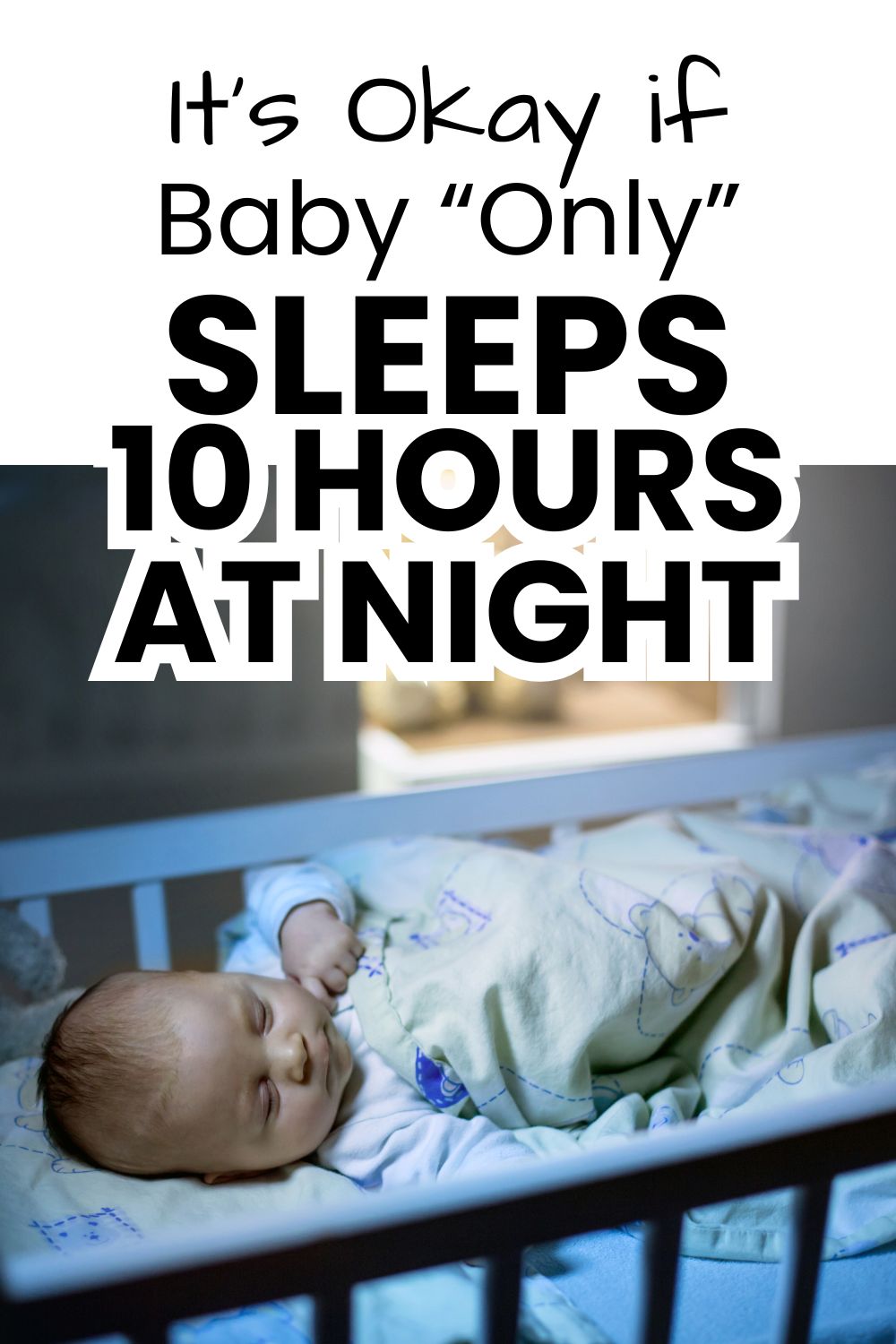Worried your Babywise baby sleeps only 10 hours at night? Learn why 10 hours of night sleep is still within the healthy range, how to assess your baby’s sleep needs, and when not to worry.
Babywise moms tend to be perfectionists. They tend to put a lot of effort into what they do and want to be sure their child is getting the best sleep he/she can get. When a Babywise mom reads that her child should be getting 10-12 hours of sleep at night, she sees only 12. 12 is higher than 10 and therefore better than 10.
But of course, not all babies need to sleep 12 hours at night. Some babies have low sleep needs. Some babies get more sleep in the day and then don’t need as much night sleep to fulfill their daily needs (but PLEASE don’t read that and think that keeping your baby up all day will lead to good sleep at night. It won’t).
10 hours of sleep at night is in the range of normal, so if your baby is sleeping “only” 10 hours at night, this might be perfectly fine.
To know how much sleep your child should be getting at any age, see Sleep Totals: How Much Sleep Should Your Child Get?
Concern About 10 Hours of Sleep at Night
I often see questions from moms who are concerned because their baby is only sleeping 10 hours at night. 10 hours of sleep is absolutely okay! Babywise (affiliate link) says baby should get 10-12 hours of sleep at night. A range is given for a reason. You have average sleep, which is calculated differently than a range. If your baby is happily in the range, you do not need to stress about averages or about the other numbers in that range.
I know 12 hours is lovely (I have had those babies!), but if they don’t need it, they don’t need it. Brayden was NEVER been a 12 hour sleeper. His longest has been 11.5 hours, and that was once he went down to 1 nap a day at 17 months old.
People vary in the amount of sleep they need. I need about 7/7.5 hours at night. My sister needs at least 9. There is that optimal length of sleep for everyone, and it varies from person to person, and baby to baby. So if your baby is happy and alert while sleeping “only” 10 hours at night, then that is likely his optimal length. There is no reason to stress if your baby is a low sleep needs baby.
How To Know if 10 Hours of Night Sleep Works for Your Baby
There are several things that can help you discern if 10 hours really is okay for your baby or not.
One is disposition. If your baby is cranky and sleepy after 10 hours at night, he likely needs more sleep. So work on figuring out the reason he isn’t sleeping the optimal length for him. There are a lot of factors that contribute to night sleep. Bedtime routine can affect night sleep. Short naps in the day can lead to poor sleep at night. Too much daytime sleep can also interfere with night sleep. The room being too hot or too cold can prevent baby from sleeping well. Inconsistent schedules and routines can lead to poor night time sleep. Inability to self soothe can mean infant sleep isn’t ideal. Your baby might need to be swaddled or might need to drop the swaddle. Your baby might sleep better with a dreamfeed. If you have a dreamfeed, it might be time to drop it. Your baby might be working on new skills and wants to practice those instead of sleep. There are so many possible reasons to disrupted sleep!
For help getting baby to sleep through the night, read this post. If you would like to know what sleeping through the night looked like for my individual children, see Sleeping Through the Night, a Tale of Four Children.
Conversely, if your baby wakes up happy in the morning, is content during awake time, and takes naps that are 1.5-2.5 hours long, then 10 hours of sleep at night is working for your baby!

Sleep Will Rearrange
As you drop naps, you can most likely shift more sleep to the night (and you will probably need to) because when children drop naps, they rarely drop sleep totals, they just rearrange it. As toddlers turn to preschoolers and grow into children, sleep totals will start to be dropped. Read more about dropping naps in this post.
Ideal Length of Night Sleep For Baby
Just remember, if your baby doesn’t need to sleep 12 hours at night, that doesn’t mean there is anything wrong with him or anything you are doing wrong. It just isn’t what he needs.
We want our sleep patterns to be consistent from day to day. We wake up at the same time each day. Bedtime is at the same time each day. We follow an eat/wake/sleep routine. As babies get older and drop naps, they don’t always eat/wake/sleep for every cycle. As naps are dropped, bedtime might move up by 30-60 minutes–at least initially, while the baby or toddler adjusts to the changes.
Safe Sleep Guidelines
You always want to follow safe sleep practices to keep your baby safe while sleeping. The American Academy of Pediatrics (AAP) has the following recommendations to help avoid SIDS (Sudden Infant Death Syndrome):
- Place your infant on their back for sleep in their own sleep space with no other people.
- Use a crib, bassinet, or portable play yard with a firm, flat mattress and a fitting sheet. Avoid sleep on a couch or armchair or in a seating device, like a swing or car safety seat (except while riding in the car).
- Keep loose blankets, pillows, stuffed toys, bumpers, and other soft items out of the sleep space.
Conclusion
I will leave you with something to look forward to. If you have a low sleep needs child, there are benefits and perks in your future. A low sleep needs baby will be a low sleep needs person throughout the years. That means your low sleep needs baby will be a low sleep needs preteen and teenager. This means your teenager will have an easier time getting out of bed in the mornings for school. My high sleep needs children are much harder to get out of bed in the mornings than my low sleep needs children (truth be told, I don’t even have to get the low sleep needs children out of bed. They get up on their own). What feels like a concern today will be a major perk in ten years!
Now that you know it is okay for baby to be sleeping “only” ten hours at night, be sure to read through my Babywise Baby First Year Overview so you know what milestones to expect when.
Related Posts

This post first appeared on this blog in July 2008


